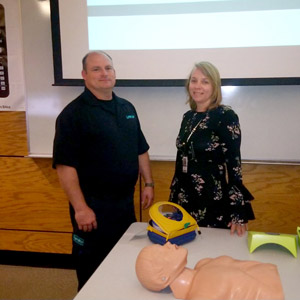

 The National Park College (NPC) First Friday Lunch and Lecture Series featured LifeNet’s
Tina Bell, Director of Marketing and Communications, and Jason Castleberry, flight
medic and a flight nurse last Friday. The pair spoke about the importance of cardiopulmonary
resuscitation (CPR) and demonstrated the need and placement of Automated External
Defibrillators (AED).
The National Park College (NPC) First Friday Lunch and Lecture Series featured LifeNet’s
Tina Bell, Director of Marketing and Communications, and Jason Castleberry, flight
medic and a flight nurse last Friday. The pair spoke about the importance of cardiopulmonary
resuscitation (CPR) and demonstrated the need and placement of Automated External
Defibrillators (AED).
Bystander CPR is for the layperson and does not require the average person to do
rescue breath, commonly known as mouth-to-mouth resuscitation. The AED is used to
help those experiencing sudden cardiac arrest. The device analyzes the heart’s rhythm
and delivers an electrical shock, or defibrillation, to help the heart re-establish
an effective rhythm, according to the American Red Cross.
The body survives on two things: glucose and oxygen. The production of these can be
maintained during CPR and can prevent cellular death as long as compressions are being
done for the first 20 minutes, according the a study by the American Heart Association.
“Patients that receive CPR between their incident and the arrival of the ambulance
are 85 percent more likely to discharge from the hospital,” stated Bell.
AED machines can be found across campus. Their locations are: